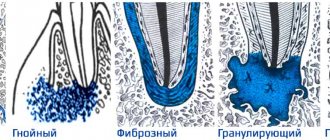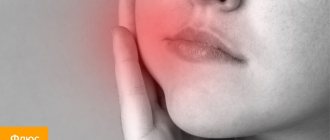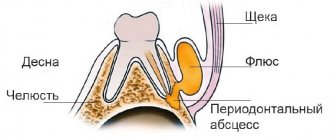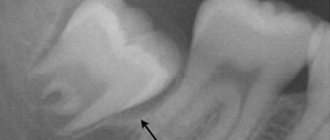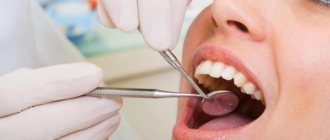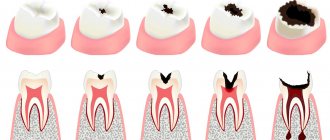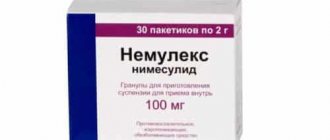Author of the article:
Soldatova Lyudmila Nikolaevna
Candidate of Medical Sciences, Professor of the Department of Clinical Dentistry of the St. Petersburg Medical and Social Institute, Chief Physician of the Alfa-Dent Dental Clinic, St. Petersburg
Many of you are probably familiar with this unpleasant state: as soon as you bite off a piece of chocolate or take the first sip of aromatic coffee, your teeth begin to “ache.” And let's be honest, "breaking" is an understatement. The jaw literally cramps with pain, and the skin instantly breaks out in goosebumps.
We’ll talk today about why the jaw suddenly begins to “ache” and the teeth begin to ache, and most importantly, how to get rid of such manifestations in the present and prevent them in the future.
How can discomfort manifest itself?
In the language of dentists, this phenomenon is called hypersensitivity or hyperesthesia. And the main causes of discomfort are abrasion and cracks of the enamel.
Pain from so-called aching teeth can manifest itself in different ways. Some patients have pain in all rows at the same time, and in some patients only 2-3 teeth hurt. The following manifestations are characteristic of hyperesthesia:
- Sharp aching pain of uncertain localization. A person complains that “the whole jaw begins to ache at once.”
- Severe pain when eating sweet/hot/cold foods and drinks.
- Pain localized to a specific part, such as the front teeth or back molars.
Dentists classify enamel hypersensitivity in different ways - according to the degree of prevalence, stage of occurrence and origin.
According to the degree of prevalence, hyperesthesia is divided into two types:
- Localized.
Occurs in the area of one or more teeth. This type of aches is caused by carious cavities and wedge-shaped defects in the necks of teeth. Sensitivity can also be caused by grinding down the enamel to install crowns. - Generalized.
This sensitivity spreads throughout the entire jaw. Hyperesthesia is provoked by periodontal tissue diseases, blooming caries and enamel erosion.
According to the causes of occurrence, hyperesthesia can be classified as follows:
- Hypersensitivity due to dental damage - caries, grinding and erosion of enamel.
- Hypersensitivity due to exposure of necks, tooth roots, as well as systemic pathologies in the body.
They are divided according to the stage of occurrence:
- 1st degree. Teeth ache due to temperature changes; the electrical excitability of dentin does not exceed 8 microamps.
- 2nd degree. Dentin begins to react not only to temperature, but also to chemical stimuli. Maximum electrical excitability is 5 microamps.
- 3rd degree. The teeth begin to cramp under any irritant, electrical excitability increases to 3 microamps.
Physiological factors
A separate group of reasons why patients experience toothache at night includes physiological factors:
- The time interval is from 00 o'clock to 5 am. This period of time is the most stressful and difficult for the entire human body. It is at this time that pain intensifies and sensitivity to any lesions and diseases, including dental ones, increases.
- Physiologists say that at night the vagus nerve called the vagus is activated, which has a large number of branches, some of which extend to the head area. The vagus affects the general condition and mood of a person. At night, the tone of the vagus nerve changes, which leads to increased sensitivity and pain.
- Also, based on the characteristics of the biorhythm, at night, even in a healthy person, blood pressure increases significantly. High blood pressure increases toothache.
Causes of toothache
As we have already said, the main reason for such painful sensations is the thinning of the enamel. Hyperesthesia can also develop due to:
- dentin reactions;
- allergies to dental medications;
- periodontal diseases;
- mechanical damage to enamel;
- hereditary predisposition.
Let's look at each cause of the problem in more detail.
Basic points of proper hygiene
Use a synthetic, medium-hard or soft brush. Change it every three months.
The toothpaste should be suitable for very sensitive teeth. Typically, such products contain hydroxyapatite, strontium chloride, fluorides, potassium nitrate, or a combination of calcium carbonate and arginine.
Take enough paste. For children under 3 years old - the size of a grain of rice, from 3 to 14 years old - the size of a pea, for adults you need to squeeze out about one centimeter.
Brush your teeth for 2 minutes: 30 seconds on each surface, top and bottom. Monitor time using an hourglass or mobile phone timer. Electric toothbrushes emit a short beep every 30 seconds and a long beep every 2 minutes from the start of brushing.
How might the nerve react?
Often teeth due to deep caries and pulpitis. And such “ache” will very soon turn into more serious, excruciating pain, not only when cleaning and eating hot or cold food, but also in a calm state, both day and night.
With pulpitis, a cavity develops in the coronal part and root canals of the teeth, where the nerve fibers are located, which over time fills with pus and blood. And although the epicenter of inflammation in this case is the nerve, the patient may initially complain that the whole row of teeth is “aching.” The sensations are localized in one tooth a little later, the pain becomes unbearable and requires the intervention of a dentist.
When you can't put off visiting a doctor
Night pain is dangerous because a person does not have the opportunity to immediately go to a doctor and fix the problem. In particular, in the pre-dawn time, against the background of pain and anxiety, blood pressure may rise and a stroke may occur.
If you have severe night pain:
- body temperature increased;
- breathing became difficult;
- heart rate increased;
- severe swelling appeared on one side of the face;
- facial sensitivity on the affected side is impaired,
We call an ambulance and don’t wait for the condition to worsen.
In cases where the pain simply becomes unbearable and it becomes impossible to endure it, look for clinics or services that provide dental care around the clock.
Important.
Be careful when taking medications. Under no circumstances should an overdose be allowed, as this can lead to an allergic reaction, including swelling.
Thinning enamel
Tooth enamel can become thinner for a variety of reasons, such as:
- improper bleaching or poor-quality professional cleaning;
- using brushes that are too hard;
- using pastes with abrasives that expose the enamel to chemical and mechanical stress;
- vitamin deficiency (the pain in this case is characterized by an aching, twitching character and manifests itself during cleaning, rinsing the mouth, eating and drinking).
Oral care
After treatment and elimination of painful sensations, to prevent such situations in the future, you should adhere to the following mandatory rules:
- Carry out regular, thorough cleaning of your teeth and gums with a brush and paste. Use additional hygiene products in the form of rinses, flosses and irrigators.
- undergo regular preventive examinations with a dentist.
- It is extremely important to eat right. To do this, you need to reduce the amount of sweets, confectionery and sweet carbonated drinks you consume. It is important to balance your diet with as many fruits, fresh vegetables, and herbs as possible.
- try not to smoke or drink alcoholic beverages. Nicotine negatively affects the entire human body. People who smoke develop pigmented plaque on their teeth, which provokes the development of gingivitis and periodontitis. Alcohol reduces immunity and contributes to the development of mucosal dystrophy.
- carefully monitor and be attentive to your health!
Dentin reaction
Dentin is the hard tissue of the tooth underneath the enamel. This is a layer that, after damage, can allow irritants to pass into the nerve zones. Dentin is destroyed during advanced stages of caries, and can also occur with inadequate dental treatment if an infection develops under a filling.
If teeth ache for this reason, the patient feels a drilling, sharp pain, similar to the sensations of purulent pulpitis.
In very rare cases, teeth ache due to the patient’s individual intolerance to certain dental medications, after visiting a doctor. In this case, the pain is accompanied by itching in the gums and palate.
Why do my teeth hurt at night but not during the day?
It would be more correct to say that your teeth hurt more at night. During the day there are too many distractions that prevent you from focusing on your feelings. Work, household chores and even simple walking force the brain to work in a different direction, which leads to less pain.
Another, main factor is physiological. In the evening, the level of corticosteroids in the body begins to decrease; they are “responsible” for reducing pain. Hormone production reaches a minimum between midnight and five in the morning, after which the tooth gradually begins to fall out. Usually by this time the exhausted body “gives up”, the person falls asleep and gets a short respite.
Another cause of night pain is the horizontal position of the body during sleep. The rush of blood to the head increases, while the nerve roots are compressed and the pain intensifies. This is especially noticeable with pulpitis, when the sensations become unbearable.
Important.
If you notice increased pain while lying down, raise the pillow higher and practically sit down. The blood will drain from your head and it will become a little easier.
It’s a special problem when the tooth under the filling hurts. This means that an infection has entered the treated cavity and an inflammatory process has begun. The resulting pus, even in a minimal amount, has no way out and begins to compress the nerve roots, which leads to severe acute pain that can even radiate to the ear and throat.
At night, it is also possible to experience minor pain after the removal of a tooth or nerve, as well as after treatment of deep caries. This is normal and does not require any serious measures to be taken. In this case, it is enough to take a tablet of any analgesic or rinse your mouth with a warm soda solution.
Important.
If you had a difficult removal and then experienced severe pain at night, you should immediately consult a doctor in the morning. Alternatively, bone fragments could remain in the socket. In this case, the entire jaw will hurt, and it will be almost impossible to relieve the sensation even with strong medications.
How to relieve pain?
If aches and pain in your teeth caught you in the middle of the night, and you only made an appointment with the doctor the day after tomorrow, try to relieve the painful sensations for a while. Here are some popular and effective ways to temporarily soothe aching teeth.
- Acupressure
will help relieve discomfort for a couple of hours. Try massaging the grooves between the phalanges of the index and thumb, the base of the ears, and the area between the cheekbone and lower jaw. - Rinse
. For an anesthetic rinse, a decoction of chamomile, St. John's wort, lemon balm, mint or oregano is suitable. Just pour 1-2 tablespoons of the dry plant with a glass of boiling water, and then keep the composition in a water bath for 20 minutes. If there are no medicinal herbs in your home medicine cabinet, rinse your mouth with a salt solution. Dissolve a teaspoon of the substance in a glass of water and begin therapy. - Painkillers
will help you rest before your visit to the doctor and relieve aching teeth. Dentists advise choosing new painkillers with each new attack of pain - Nurofen, Analgin, Ketanov, paracetamol, aspirin. However, do not under any circumstances overdo it with pills! Firstly, these drugs are addictive, and secondly, they have a bad effect on the liver, kidneys, gastrointestinal tract and other systems in the body. - Clove, mint and sea buckthorn oils
will help relieve pain and even relieve swelling of the gums. For pain relief, it is enough to soak cotton swabs and cover the sore teeth. Tampons should be changed every 2 hours. - Propolis
is an excellent natural anesthetic, similar in action to novocaine. To pacify dental aches and pain, you can wipe the gums with an alcohol solution of propolis or moisten cotton wool with it and cover the sore tooth. Some dentists advise using propolis in plates: you can simply cover the hole with a piece of the substance or put propolis on the gum near the tooth. The product is prohibited for patients who suffer from allergies to honey and other bee products. - Garlic,
according to patient reviews, helps to forget about the painful aches for a couple of hours. You can use a cut or ground clove, applying it to a sore tooth, or chew garlic with black bread and hold it in your mouth. This vegetable warms the skin, so it can be used as an irritant for acupuncture points. To soothe a toothache, a paste of two cloves of garlic should be applied to the inside of the wrist on your hand (the opposite side on which the tooth hurts). The medicine is fixed on the skin with a bandage and lasts for several hours. - radishes
have been used to treat toothache and gum inflammation. To prepare a natural analgesic, you need to wash the vegetable, peel it from the skin and grate it on a fine grater, and then pour 2 tablespoons of the pulp with 0.5 liters of boiling water. To relieve pain with the composition, you need to rinse your mouth every hour. - Plantain root
is an excellent summer analgesic. Simply rinse it and apply it to the sore tooth. After 20-30 minutes the pain will go away.
For toothache of infectious origin, Asepta Active mouth rinse is an effective analgesic, antibacterial and anti-inflammatory agent. This product combines a combination of benzydamine and chlorhexidine, which not only has a pronounced antibacterial effect, but also prevents inflammation and bleeding of the gums, freshens breath and prevents the formation of plaque.
Wisdom tooth hurts
A special unit in our body is the wisdom tooth. It usually erupts at the age of 18-25 years, and severe pain may occur. The molar breaks through the bone and gum tissue, essentially tearing it apart. At night, the pain may intensify; it can be relieved with the help of pain-relieving gels (Cholisal, Metrogyl Denta, Asepta) or analgesics.
It’s good if the tooth runs vertically and has enough space in the gum. A much worse option is when the molar breaks through at an angle or even horizontally. The “figure eight” puts pressure on the roots of neighboring teeth and displaces them. In addition to pain, swelling of the gums and cheeks may appear, as well as an increase in body temperature. As a temporary option, you can take painkillers, but the problem will have to be resolved with a surgeon. As always, the sooner the better.
A wisdom tooth can simply hurt due to caries, pulpitis, periodontitis, or cysts. Another reason is inflammation of the so-called hood, a fold on the gum that forms when teeth erupt. The cause of pericoronitis is the accumulation of food particles, which gradually begin to rot, accompanied by pain in the “eight” area. In the most severe situations, pus begins to secrete.
To relieve pain, you can rinse your mouth with warm infusions of herbs (sage, chamomile), use a gel and take a pain reliever. And in the morning - to the doctor.
Important.
A wisdom tooth is also a tooth. But, if it interferes with the normal position of the teeth, causes crowding, or if the dentin is deeply damaged, dentists recommend removing it.
What is absolutely forbidden to do?
In order not to double the painful sensations of aching in the jaw, it is important to adhere to several rules before visiting a doctor:
- Regularly clean the oral cavity of food debris; sometimes it is particles from lunches and dinners that often become the cause of especially severe pain in pulpitis and periodontitis.
- Never chew on the side of the affected tooth.
- Heating a sore spot is strictly prohibited. Any hot compresses increase blood flow and increase pain.
- Try not to be in a lying position; this position activates blood circulation in the periodontal tissues and increases pressure on them.
We have listed the main ways to relieve toothache. However, these methods, with all their diversity, will not help cure the cause of the unpleasant manifestation and are only a temporary measure. As soon as you feel your teeth hurting, make an appointment with the dentist. Believe me, the sooner you start treatment, the faster and cheaper you will get rid of painful sensations.
If pain occurs when pressing on a filled tooth
It happens that outwardly the unit looks fine (the filling is sealed, the crown has not changed its color), but, nevertheless, painful symptoms periodically make themselves felt. This situation is considered normal only in the first day after the filling is installed. Then the pain should disappear. If it persists for a long time, then something is wrong.
Most likely, an inflammatory reaction has developed. She needs to be docked. To do this, you should make an appointment with your dentist. The doctor will conduct an in-person examination, instrumental examination, and take pictures. This will allow him to understand why the pain appeared and, based on the information received, create a progressive treatment plan.
Clinical researches
Repeated clinical studies have proven that the two-component mouth rinse ASEPTA ACTIVE more effectively combats the causes of inflammation and bleeding compared to single-component rinses - it reduces inflammation by 41% and reduces bleeding gums by 43%.
Sources:
- The effectiveness of the use of Asept “adhesive balm” and Asept “gel with propolis” in the treatment of chronic generalized periodontitis and gingivitis in the acute stage (Municipal Dental Clinic No. 4, Bryansk, Kaminskaya T. M. Head of the therapeutic department Kaminskaya Tatyana Mikhailovna MUZ City Dental Clinic No. 4, Bryansk
- Study of the clinical effectiveness of treatment and prophylactic agents of the Asepta line in the treatment of inflammatory periodontal diseases (A.I. Grudyanov, I.Yu. Aleksandrovskaya, V.Yu. Korzunina) A.I. GRUDYANOV, Doctor of Medical Sciences, Prof., Head of Department I.Yu. ALEXANDROVSKAYA, Ph.D. V.Yu. KORZUNINA, asp. Department of Periodontology, Central Research Institute of Dentistry and Maxillofacial Surgery, Rosmedtekhnologii, Moscow
- The role of anti-inflammatory rinse in the treatment of periodontal diseases (L.Yu. Orekhova, A.A. Leontyev, S.B. Ulitovsky) L.Yu. OREKHOVA, Doctor of Medical Sciences, Prof., Head of Department; A.A. LEONTIEV, dentist; S.B. ULITOVSKY, Doctor of Medical Sciences, Prof. Department of Therapeutic Dentistry of St. Petersburg State Medical University named after. acad. I. P. Pavlova
- Report on the determination/confirmation of the preventive properties of personal oral hygiene products “ASEPTA PLUS” Remineralization doctor-researcher A.A. Leontyev, head Department of Preventive Dentistry, Doctor of Medical Sciences, Professor S.B. Ulitovsky First St. Petersburg State Medical University named after. acad. I.P. Pavlova, Department of Preventive Dentistry
Periostitis in children
In children, the inflammatory process usually develops as a result of untreated caries of baby teeth, infectious diseases or injuries. Due to the peculiarities of the physiology and anatomy of the child’s body, as well as due to the immaturity of the child’s immune system, the pathology develops quickly and rapidly, and the infection quickly spreads through the bloodstream and lymph flow, so multiple lesions can form.
Periostitis of the upper jaw in a child requires special attention, which, when localized in the palate, may not change facial features - swelling forms inside the oral cavity and can only be noticed by the characteristic convex swelling on the palate. The abscess gradually grows, capturing the mucous areas of the pharynx and tongue, which causes pain when swallowing and chewing. If a child develops symptoms such as fever, loss of appetite, or painful swallowing, it is imperative to check whether such a condition is caused by developing gumboil.
Cleaning sequence
- Using sweeping movements, clean the outer and then the inner surfaces of the bottom row. Move from molars to incisors. Then do the same on the top row. Hold the brush at a 45-degree angle and do not use a sawing motion. This leads to damage to the enamel.
- Brush chewing surfaces with small circular movements.
- Close your jaws and walk along your gums in a circular motion.
- Brush your tongue using a leisurely four to five strokes from root to tip.
- Treat the interdental spaces with dental floss.
- Rinse your mouth.
It is more effective to clean with an electric brush or irrigator. The quality of hygiene increases 3–4 times. Hyperesthesia can be dealt with faster.
Is it possible to strengthen sensitive teeth at home?
Yes. If you can’t get to the dentist, you can try to help yourself. There are several remedies that can solve the problem of hyperesthesia at home.
Table 3. Popular products for home use
| № | Name | Mechanism of action | Age category |
| 1. | ROCS Medical Minerals, GC Tooth Mousse | Remineralizing gels | Adults and children |
| 2. | Colgate Duraphat 2800 ppm | Fluoridating paste | 10–15 years |
| 3. | Colgate Duraphat 5000 ppm | From 16 years old | |
| 4. | ELMEX junior | Fluoridating paste | 6–12 years |
| 5. | ELMEX | From 13 years old | |
| 6. | LACALUT Extra Sensitive | Paste that reduces tooth sensitivity | For adults |
| 7. | Colgate Sensitive Pro-Relief | ||
| 8. | PRESIDENT Sensitive | ||
| 9. | LACALUT Sensitive, 300 ml | Rinse for sensitive enamel | From 15 years old |


